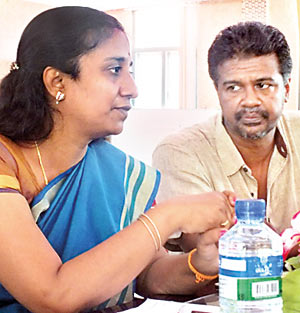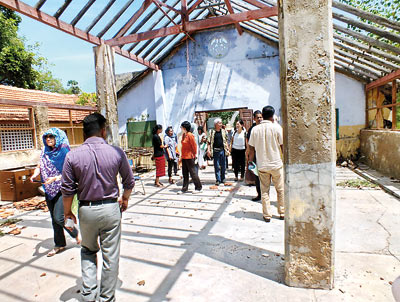Jaffna tourism taking off after January 2015 presidential polls

Ms. G Anton Yoganayagam, DS Kayts explains a point. Firzan Hashim, Deputy Executive Director – CHA, is next to her.
Like the rising sun, the Northern Province is rising from the ashes of a man-made disaster and under a new era following the Presidential Elections in January.
There appears to a new impetus and vigour in the city based on the conversations the Business Times had with people on the street, villagers, business community and the travel industry officials.
Thilak T. Thilagaraj, Managing Director, Tilko Jaffna City Hotels (Pvt) Ltd and President, Northern Province Tourism Association, told the newspaper sitting at his hotel that since the results of the Presidential Elections there is a great resurgence in the travel trade with more rooms coming up and increasing the room capacity in hotels to total around 300.
Further, he said that there is a large number of small hotels and guest houses of 10 to 12 rooms each in place. Mr. Thilagaraj said for the last few months the tourism influx is around 40 per cent and the occupancy rate in all hotels have shot up to around 60 per cent from far less earlier.
When he was asked whether the visibility of skeleton frames of houses almost fully damaged by the war would affect the traveller perception of the area, Mr. Thilagaraj said that it is not so bad so. But he pointed out that these travellers carry these ‘dreadful memories’ back to their homes and therefore is necessary to rebuild these structures.
Mr. Thilagaraj said that the government should invest in human capital as there is no proper managerial cadres in their hotels and thus hotel management training centres are a necessity.
He said the government’s liberal policy is encouraging former residents to revisit with one of his cousins who had migrated to Canada in 1990 now planning to visit Jaffna – his birthplace.
At the same hotel, the newspaper met V. K. Vignesh, Chairman, Chamber of Commerce and Industries of Yarlpanam who gave a clear picture of the region’s trade and industry. He said that a large number who migrated to various foreign countries and are doing very well in those countries are now coming to their birthplace in the North on a large scale.
Expatriate Tamils are also investing heavily and urged the government to develop ways of attracting them so expatriates could fill the gap for foreign investment.
In the meantime, the Asia Pacific Alliance for Disaster Management (A-PAD) Sri Lanka that included ‘From the People of Japan’; Consortium of Humanitarian Agencies Sri Lanka CHA) and the Ceylon Chamber of Commerce hosted a symposium in Jaffna on ‘Public – Private Partnership Towards Disaster Resilience and Sustainable Development’ which has a major impact on the economy of any country. A large number of delegates from countries like Korea, Japan, Indonesia, Bangladesh and the Philippines and local delegates of more than 200 took part.

A-PAD foreign delegates at the war-devastated J/Karampon Shanmuganatha MV school at Kayts
The day following the symposium, the delegates visited Kayts, an isolated land mass where the population of 80,000 earlier has now reduced to 10,000. In this area houses are rarely visible and there are many abandoned and completely destroyed houses and schools.
Ms. G Anton Yoganayagam, Divisional Secretary, Kayts enumerated the vast number of difficulties the people of that area face, main problems being flooding by sea water seeping into the land and cultivation being impossible, the main livelihood fishing restricted only to three days due to Indian trawlers poaching and the scarcity of drinking water, among a host of other problems.
The delegates, specially, the foreign ones, listened attentively to the woes enumerated by the DS and while sympathising with the people of Kayts promised to help them.


